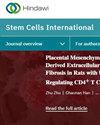干细胞条件培养基移植中牙髓和牙本质复合体及牙周韧带再生过程中的宿主微环境候选调节因子--Periostin
IF 3.3
3区 医学
Q2 CELL & TISSUE ENGINEERING
引用次数: 0
摘要
目的。微环境是组织在体内保持其特性的必要条件。微环境包括形成组织的细胞类型和三维排列,以及它们与邻近细胞和细胞外基质的相互作用,干细胞龛就是其中的代表。组织再生并不取决于移植细胞的原始组织来源,而是取决于细胞移植的微环境。我们曾报道过在异位根移植模型中,仅通过移植条件培养基就能实现牙髓再生,这表明宿主来源的细胞表达了条件培养基中的迁移因子受体,并迁移到根管中,导致牙髓再生。再生医学需要恢复复杂组织的原有功能。要实现这一目标,必须再现伴随再生反应的宿主组织微环境的变化。因此,在体内再现微环境对于组织再生疗法的进一步发展非常重要。表皮生长因子也存在于上皮-间质交界处,其表达部位因矿化基质阶段而异,并参与钙化的调节。方法。我们研究牙髓干细胞是否有助于再生牙髓组织的微环境变化。将牙髓干细胞诱导到牙本质中,用 qPCR 分析 DSPP、nestin、DMP1、Runx2 和 periostin 的基因表达,用 IHC 分析蛋白表达。同样,在异位移植获得的再生牙髓中,采用 qPCR 分析基因表达,采用 IHC 分析蛋白质表达。结果。由于这些再生组织可在同一切片上观察到,因此可以了解组织内微环境的变化。结论骨膜促进了牙髓干细胞的增殖、I型胶原的迁移以及再生牙髓的钙化。本文章由计算机程序翻译,如有差异,请以英文原文为准。
Periostin Is a Candidate Regulator of the Host Microenvironment in Regeneration of Pulp and Dentin Complex and Periodontal Ligament in Transplantation with Stem Cell-Conditioned Medium
Purpose. The microenvironment is required for tissues to maintain their properties in vivo. This microenvironment encompasses the types and three-dimensional arrangement of cells forming the tissues, and their interactions with neighboring cells and extracellular matrices, as represented by the stem cell niche. Tissue regeneration depends not on the original tissue source of the transplanted cells, but on the microenvironment in which they are transplanted. We have previously reported pulp regeneration in a heterotopic root graft model by transplantation of conditioned medium alone, which suggests that host-derived cells expressing receptors for migration factors in conditioned medium migrate into the root canal and cause pulp regeneration. Regenerative medicine is needed to restore the original function of complex tissues. To achieve this, it is necessary to reproduce the changes in the microenvironment of the host tissue that accompany the regenerative response. Therefore, it is important to reproduce the microenvironment in vivo for further development of tissue regeneration therapy. Periostin is also found in the epithelial–mesenchymal junction, with expression sites that differ depending on the mineralized matrix stage, and is involved in regulation of calcification. Methods. We investigate whether periostin contributes to microenvironmental changes in regenerated pulp tissue. Dental pulp stem cells were induced into dentin, and gene expression of DSPP, nestin, DMP1, Runx2, and periostin was analyzed by qPCR and protein expression by IHC. Similarly, gene expression was analyzed using qPCR and protein expression using IHC in regenerated dental pulp obtained by ectopic transplantation. Results. Since these regenerated tissues were observable on the same slice, it was possible to understand changes in the microenvironment within the tissues. Conclusions. Periostin promoted proliferation of pulp stem cells, migration in type I collagen, and calcification in regenerated pulp, which strongly suggests that periostin is a promising candidate as a factor that contributes to the microenvironment of regenerated pulp.
求助全文
通过发布文献求助,成功后即可免费获取论文全文。
去求助
来源期刊

Stem Cells International
CELL & TISSUE ENGINEERING-
CiteScore
8.10
自引率
2.30%
发文量
188
审稿时长
18 weeks
期刊介绍:
Stem Cells International is a peer-reviewed, Open Access journal that publishes original research articles, review articles, and clinical studies in all areas of stem cell biology and applications. The journal will consider basic, translational, and clinical research, including animal models and clinical trials.
Topics covered include, but are not limited to: embryonic stem cells; induced pluripotent stem cells; tissue-specific stem cells; stem cell differentiation; genetics and epigenetics; cancer stem cells; stem cell technologies; ethical, legal, and social issues.
 求助内容:
求助内容: 应助结果提醒方式:
应助结果提醒方式:


